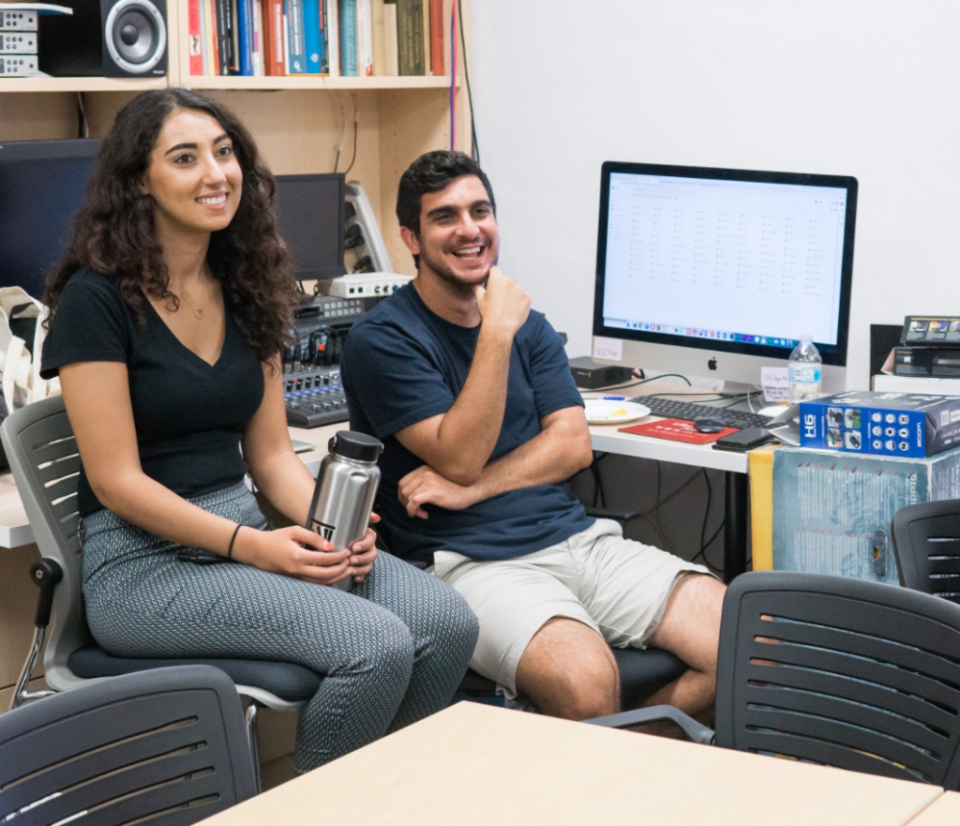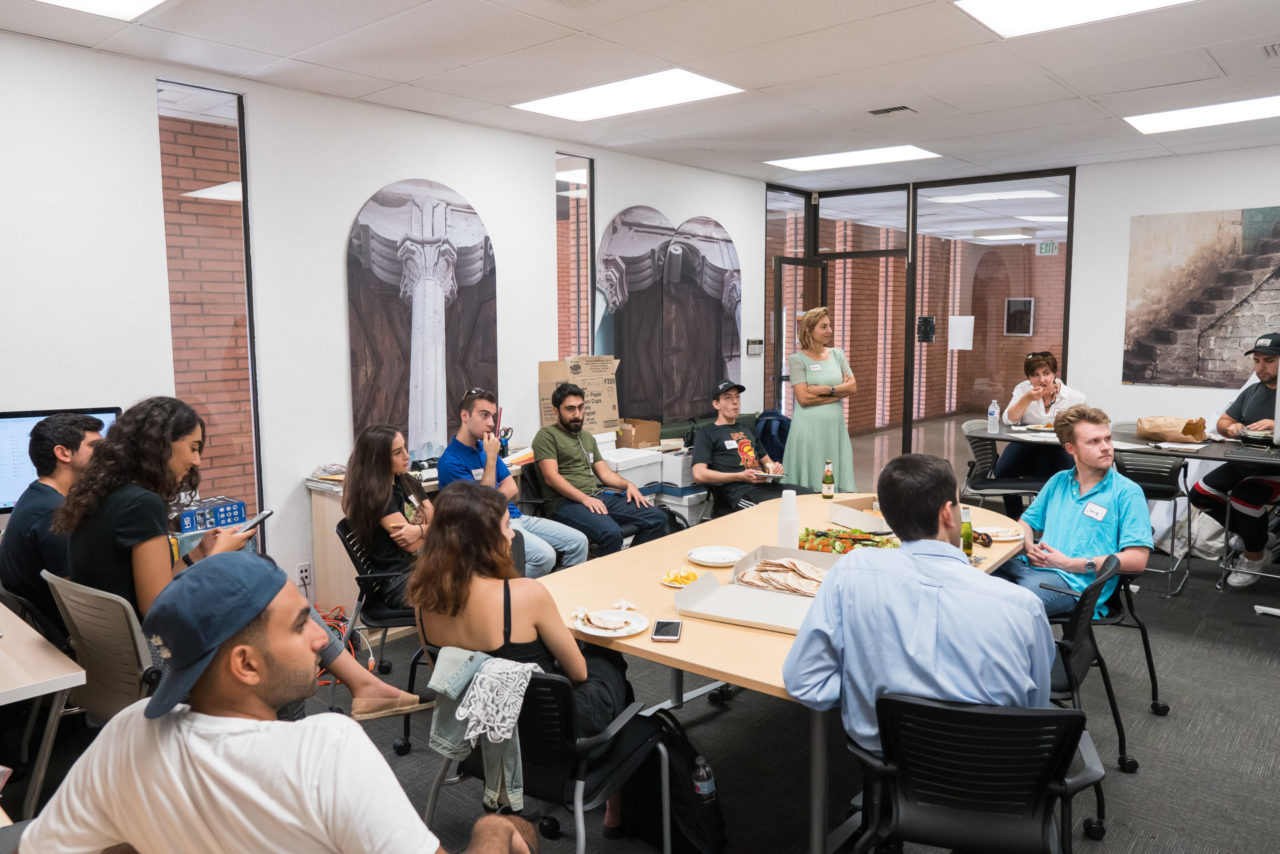LOS ANGELES – When the USC Institute of Armenian Studies kicked off the Spring 2020 semester with its largest ever group of undergraduate and graduate student workers, no one knew that they’d spend a good part of the semester working from home. Fifteen students from various backgrounds and areas of study were assigned new media and podcast projects, short films, event planning, and working on digitizing the Institute’s archival collection.
In the midst of the University’s COVID-19 shutdown, the students continue to do the same, even as they take online classes and work hard to complete the semester, which for some of them is their last semester at USC.
Even as they work at home, members of the staff have been inviting students to ‘meet’ about every 10 days, to touch base and to reflect on this very odd time.
They also regularly update their supervisors on their tasks. At the Institute, student workers have had the unique opportunity to engage in programs that combine their areas of study with their interests in the many aspects of Armenian studies.
Tatyana Aposhian, a graduate student completing her last year in the USC Marriage and Family Therapy (MMFT) graduate program, transcribes interviews collected as part of the Displaced Persons Documentation Project. This is part of the Institute’s larger Digital Diaspora Initiative.
“Working at the Institute has fostered this passion on a personal level, where I have the opportunity to listen to the rich histories of our diaspora. Because of this role, I feel a deeper connection and closeness to my Armenian community and culture,” says Aposhian.
Alec Muradliyan, a junior studying Business Administration at USC, transcribes interviews for a pilot project, which focuses on documenting the experiences of individuals who have played a role in shaping the Armenian diaspora community of Los Angeles. The stories will be used to integrate the Armenian experience within a global context and provide new generations access to their own histories.
“These stories are very significant and precious in Armenian families, which is why I am so passionate about doing my part to preserve them for future generations,” Muradliyan says.
Samvel Krajian, an undergraduate in Music Composition who recently had the opportunity to collaborate with the USC Glorya Kaufman School of Dance for the “Choreographers & Composers 2020” program, is identifying Armenian music and interview bits from old radio programs to be used for the Institute’s podcasts. He also transliterates titles of the Institute’s library collection to create a catalog.
“I found myself strengthening my relationship with the Armenian language while learning to transliterate in order to build and expand our library of Armenian books,” Krajian says. “The opportunity to further realize my culture and language at the Armenian Institute has been one that I am grateful for.”
The Institute’s collection of books, focused on the 20th century Armenian experience, is growing. Allen Grakasian, a graduate student in public health, is cataloging the in-house collection.
Katarina Terzyan, an undergraduate senior studying International Relations, maintains the Institute’s communication platforms and ensures that scholars and researchers across the globe have access to Institute opportunities.
“Being a part of the Institute, you never really know who may walk into the office or what you might end up taking away that day. It is a constant learning experience – from meeting a dance instructor to hearing a live recording of a new podcast episode, being engaged is a fun and interesting experience.”
With its wide global network, the Institute has served as a learning hub for students, introducing them to activists, policymakers, and community members.
The rest of the student workers, Aida Azatian, Shant Hambarchian, Kajik Khanian, Shant Martirossyan, Ani Matevosyan, Ryan Mekenian, Daniel Muncherian, Alexia Ouzonian, Leana Ter-Martirosyan, and Lara Thomas are heavily involved in planning, organizing, and carrying out events throughout the year. Some of these are on hold. But the Institute — and the students — continue to prepare the groundwork.
They also initiate their own events, like Open Mind Policy, which is a series of student-led discussions on topics relating to the Armenian-American experience.
Lucine Beylerian, an undergraduate senior studying Philosophy, initiated and leads the Open Mind Policy events. The discussions provide an outlet for students who are looking to engage in thought-provoking discussions regarding identity, culture, and the societal aspects of being part of the Armenian community. From speaking to a techie-turned-priest to sharing what one might not be able to share with one’s grandmother, the students become reflective and find strength in sharing.
“I’ve been working at the Institute for a year and a half now, and I am glad to say that I have been able to contribute to multiple projects while learning about Armenian Studies along the way,” Beylerian says. “Now in my last semester at USC, I am grateful that I have been given the opportunity to integrate my studies in philosophy with the Institute by launching the Open Mind Policy series.”











